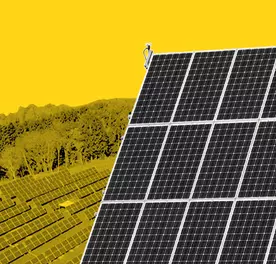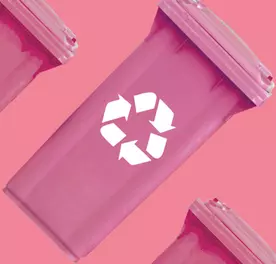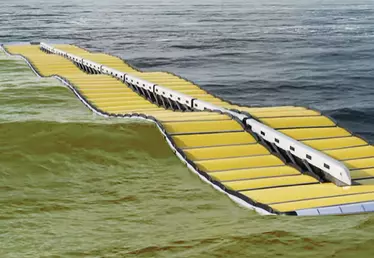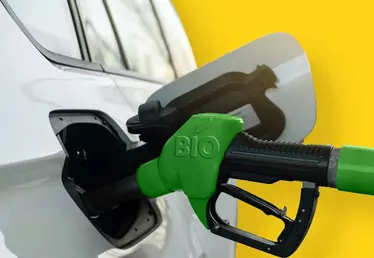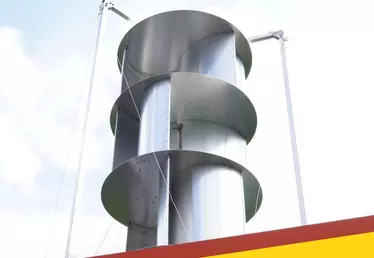

Hero banner custom title
In Istanbul, a new plant makes biofuel from algae
3 min
Turkey’s Bogazici University has just opened the world’s first carbon-negative biorefinery in Istanbul, with researchers here transforming microalgae to produce a variety of biofuels - starting with jet fuel.
Istanbul’s Bogazici University, with its leisurely campus on the shores of the Black Sea, is home to a number of researchers working on growing and transforming microalgae that can then be used to produce biofuel (among other outputs). The refinery they have built, co-financed by the European Union and the Turkish Ministry of Industry and Technology, opened in January 2022 under the aegis of the INDEPENDENT (Integrated Biorefinery Concept for Bioeconomy-Driven Development) project. To ensure the algae in question receive the natural light that they need, they are being grown in both outdoor pools and indoor greenhouse tubes.
Microalgae to reduce aviation's carbon footprint
The process here sees the researchers transforming two or three week old algae. The lipids produced by these microorganisms - invisible to the naked eye – can then be used to make jet or automotive fuel.
The basic principle is that the algae will evolve via photosynthesis, absorbing atmospheric CO₂ and transforming it into oxygen.
Hence the usefulness of producing what has come to be known as algo-fuels, based on the fact that algae are capable of offsetting whatever CO₂ is released during a fuel combustion process. According to INDEPENDENT project coordinator Berat Haznedaroğlu, one kilo of microalgae can capture between 1.6 and 1.8 kg of CO₂ - potentially making microalgae a useful tool for the production of sustainable fuel. Moreover (and unlike other biofuels made from rapeseed or soybean oil), microalgae production does not encroach upon farmland or usurp food crops. Instead, they are a commodity that can grow – very quickly – in vats and/or seawater.
“The CO₂ needed for photosynthesis can also be derived from flue gasses or else from the nutrients that the algae need (like nitrogen or phosphorus) - meaning that it can be sourced from wastewater treatment and food processing plants alike. This both creates an opportunity to apply a circular economy model and to minimize any environmental impacts”.
The first aircraft powered by algo-fuels scheduled to fly by yearend 2022
About 80% of current output from this wind-powered bio-refinery - Europe’s first carbon-negative facility of its kind – will be reserved for jet fuel possessing sufficient energy density to enable the takeoff of planes flying for Turkish Airlines, the country’s national carrier. In Haznedaroğlu’s words, "Civil aviation has highly regulated safety standards. We will need to produce sufficient biofuel to cover all testing, standardization and certification requirements before we even consider fueling a plane”
The project currently aims to achieve a 1% to 5% biofuel-kerosene blend.
Safety standards allow up to a 50% biofuel mix but producing such large quantities requires much larger industrial capacities.
All in all, sustainable fuels have a long way to go before reaching peak scalability. They now account for a mere 0.1% of all aviation fuel – and remain about three to five times more expensive than other sources. Algo-fuel, viewed today as a “third generation” biofuel, remains “very minimal”, in Haznedaroğlu’s view, with the main obstacles being “the outdoor ponds’ low productivity and high energy needs when microalgae are being harvested for their lipids".
In addition to researchers’ efforts to improve microalgae’s cultivation and transformation processes, the biorefinery is also interesting because it offers a viable alternative model. Because all outputs are used to manufacture a wide variety of products (including food supplements like spirulina; fertilizers; and animal feed), the site both generates zero waste and incurs lower production costs. As Haznedaroğlu says, “Our production infrastructure has already evolved beyond the beta stage and can easily operate on a large scale. The main objective now is therefore to convince entrepreneurs that the project, when scaled up, is both economically feasible and environmentally sustainable”.
This promising idea is being developed in other parts of Europe as well - with a similar project emerging in France near Marseille.

